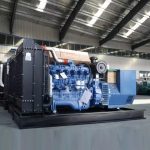Efficient Frequency Control Using Diesel Generators A Comprehensive Guide
Introduction In modern power systems, frequency control plays a crucial role in maintaining a stable and reliable supply of electricity. Fluctuations in frequency can lead to disruptions in power quality and can even cause damage to electrical equipment. Diesel generators are commonly used to provide frequency control in power systems due to their ability to respond quickly to changes in demand. This article will explore the role of diesel generators in frequency control, their advantages and limitations, and the various technologies and strategies used to optimize their performance. Role of Diesel Generators in Frequency Control Diesel generators are widely used in power systems for frequency control due to their ability to provide fast and reliable response to changes in load demand. In a power system, the frequency of the alternating current (AC) is directly related to the balance between generation and load. When the load on the system changes, the frequency can deviate from its nominal value. 400kw diesel generator can be used to quickly adjust the generation output to maintain the frequency within acceptable limits. One of the key advantages of diesel generators for frequency control is their ability to start and reach full output within seconds. This rapid response time allows diesel generators to quickly compensate for sudden changes in load demand or generation loss. In addition, diesel generators can operate at varying power levels, making them versatile for providing frequency control in different operating conditions. Advantages of Using Diesel Generators for Frequency Control There are several advantages to using diesel generators for frequency control in power systems: 1. Fast Response Time: Diesel generators can start and reach full output within seconds, making them ideal for responding to sudden changes in load demand or generation loss. 2. Versatility: Diesel generators can operate at varying power levels, allowing them to provide frequency control in different operating conditions. 3. Reliability: Diesel generators are known for their robustness and reliability, making them a dependable source of backup power for frequency control. 4. Fuel Efficiency: Diesel generators are relatively fuel-efficient compared to other types of generators, making them a cost-effective option for frequency control in power systems. 5. Scalability: Diesel generators can be easily scaled up or down to meet the specific requirements of a power system, making them flexible for use in a wide range of applications. Limitations of Using Diesel Generators for Frequency Control While diesel generators offer many advantages for frequency control in power systems, there are also some limitations to consider: 1. Environmental Impact: Diesel generators emit pollutants such as nitrogen oxides (NOx) and particulate matter, which can have negative effects on air quality and public health. 2. Operating Costs: Diesel fuel can be expensive, especially in regions where fuel prices are high, which can increase the operating costs of using diesel generators for frequency control. 3. Maintenance Requirements: Diesel generators require regular maintenance to ensure optimal performance, which can add to the overall operating costs and downtime. 4. Noise and Vibration: Diesel generators can be noisy and produce vibrations during operation, which can be a concern in residential or sensitive environments. Technologies and Strategies for Optimizing Diesel Generators for Frequency Control To overcome the limitations of using diesel generators for frequency control and maximize their performance, various technologies and strategies can be implemented: 1. Hybrid Systems: Integrating diesel generators with renewable energy sources such as solar or wind power can help reduce fuel consumption and emissions while maintaining frequency control. 2. Energy Storage Systems: Combining diesel generators with energy storage systems such as batteries can improve the overall efficiency and flexibility of frequency control in power systems.  3. Advanced Control Algorithms: Implementing advanced control algorithms and predictive modeling techniques can optimize the operation of diesel generators for frequency control and reduce fuel consumption. 4. Remote Monitoring and Diagnostics: Using remote monitoring and diagnostic systems can help detect potential issues with diesel generators early on, improving reliability and reducing downtime. 5. Load Management: Implementing load management strategies can help balance the load on the power system and reduce the reliance on diesel generators for frequency control. Conclusion Diesel generators play a crucial role in providing frequency control in power systems, thanks to their fast response time, versatility, and reliability. While diesel generators offer many advantages for frequency control, there are also limitations to consider, such as environmental impact and operating costs. By implementing technologies and strategies such as hybrid systems, energy storage, advanced control algorithms, remote monitoring, and load management, the performance of diesel generators for frequency control can be optimized and their impact on the environment and operating costs minimized. Overall, diesel generators remain a valuable asset in ensuring the stability and reliability of power systems through effective frequency control.
3. Advanced Control Algorithms: Implementing advanced control algorithms and predictive modeling techniques can optimize the operation of diesel generators for frequency control and reduce fuel consumption. 4. Remote Monitoring and Diagnostics: Using remote monitoring and diagnostic systems can help detect potential issues with diesel generators early on, improving reliability and reducing downtime. 5. Load Management: Implementing load management strategies can help balance the load on the power system and reduce the reliance on diesel generators for frequency control. Conclusion Diesel generators play a crucial role in providing frequency control in power systems, thanks to their fast response time, versatility, and reliability. While diesel generators offer many advantages for frequency control, there are also limitations to consider, such as environmental impact and operating costs. By implementing technologies and strategies such as hybrid systems, energy storage, advanced control algorithms, remote monitoring, and load management, the performance of diesel generators for frequency control can be optimized and their impact on the environment and operating costs minimized. Overall, diesel generators remain a valuable asset in ensuring the stability and reliability of power systems through effective frequency control.